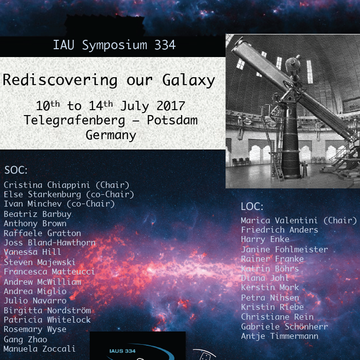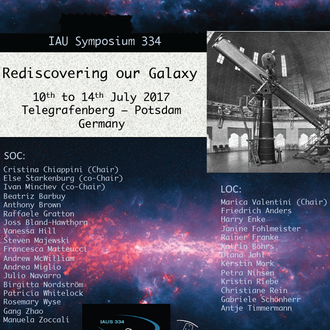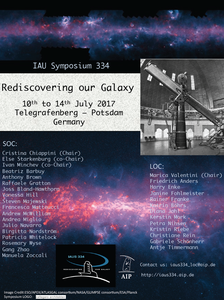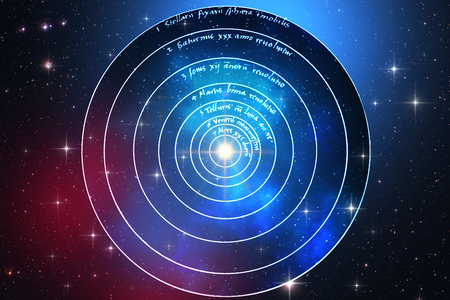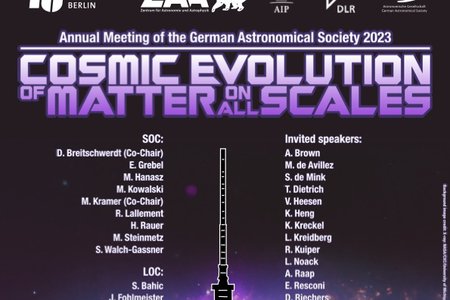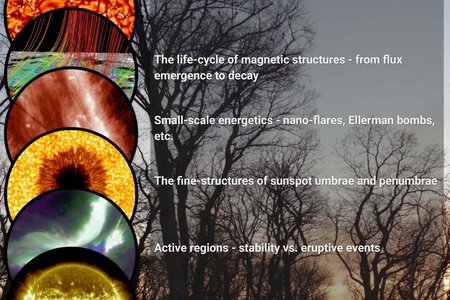IAU Symposium to take place in Potsdam
At the 98th International Astronomical Union (IAU) Executive Committee meeting last May in Mexico the IAU Symposium 334 "Rediscovering our Galaxy" was approved to take place from the 10th to the 14th of July 2017 in Potsdam, Germany.
The aim of the IAU is to promote astronomy through international cooperation, and the key activity of the IAU is the organization of scientific meetings. Each year the IAU sponsors nine international IAU Symposia. In the last 25 years, only eight International IAU Symposia took place in Germany, with three of these (1992, 1993 and 2000) held in Potsdam. After 16 years, the IAU now returns to Germany with a symposium thanks to a successful application by AIP scientist Cristina Chiappini. The proposal was selected from more than 30 applications submitted for the coveted symposia.
The conference poster shows the Great Refractor, a historic telescope located in Potsdam, against the backdrop of a spectacular view of the Milky Way. "The poster communicates how new research on our Galaxy challenges conventional ideas on how it was formed," explains Cristina Chiappini, who also chairs the scientific organising team of the symposium. Marica Valentini, head of the local organizing committee adds: "We are honoured to have an IAU symposium in Potsdam for the first time since 2000."
The upcoming symposium confirms the leading role of the AIP in the research field of Galactic archaeology, i.e., the study of the motion and chemical composition of stars to uncover the history of our Milky Way.
Symposium website: https://iaus334.aip.de
Science contact: Dr. Cristina Chiappini, +49 331 7499-454, cristina.chiappini@aip.de
Media contact: Dr. Janine Fohlmeister, +49 331 7499-802, presse@aip.de
At the 98th International Astronomical Union (IAU) Executive Committee meeting last May in Mexico the IAU Symposium 334 "Rediscovering our Galaxy" was approved to take place from the 10th to the 14th of July 2017 in Potsdam, Germany.
The aim of the IAU is to promote astronomy through international cooperation, and the key activity of the IAU is the organization of scientific meetings. Each year the IAU sponsors nine international IAU Symposia. In the last 25 years, only eight International IAU Symposia took place in Germany, with three of these (1992, 1993 and 2000) held in Potsdam. After 16 years, the IAU now returns to Germany with a symposium thanks to a successful application by AIP scientist Cristina Chiappini. The proposal was selected from more than 30 applications submitted for the coveted symposia.
The conference poster shows the Great Refractor, a historic telescope located in Potsdam, against the backdrop of a spectacular view of the Milky Way. "The poster communicates how new research on our Galaxy challenges conventional ideas on how it was formed," explains Cristina Chiappini, who also chairs the scientific organising team of the symposium. Marica Valentini, head of the local organizing committee adds: "We are honoured to have an IAU symposium in Potsdam for the first time since 2000."
The upcoming symposium confirms the leading role of the AIP in the research field of Galactic archaeology, i.e., the study of the motion and chemical composition of stars to uncover the history of our Milky Way.
Symposium website: https://iaus334.aip.de
Science contact: Dr. Cristina Chiappini, +49 331 7499-454, cristina.chiappini@aip.de
Media contact: Dr. Janine Fohlmeister, +49 331 7499-802, presse@aip.de
